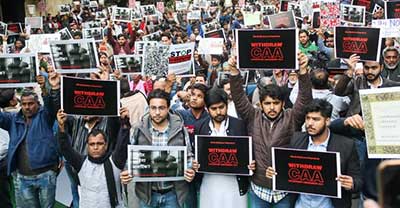Relevance: GS-2: Government policies and interventions for development, and issues arising out of their design and implementation.
Key phrases: Freedom House’s, political rights and civil liberties, UAPA, surveillance, Pegasus, Lakhmipur Kheri, love jihad.
Why in News?
- India, for the second consecutive year, continues to not completely free country, according to the findings in the Freedom of the World report.
Context:
- According to Freedom House’s Freedom in the World report India’s status, for the second consecutive year, continues to not completely free country, giving it ‘global freedom score’ of 66/100 after judging it on various political rights and civil liberties.
- This year, India has dropped a point to score 66 on 100, compared to 2021. While the reports until 2020 have called India a free country, the scores are consistently dropping since 2017.
- While half a decade ago, India scored 77 on 100, the score dropped to 75 in 2019 and 71 in 2020.
- India’s freedom scores are similar to that of Bolivia, Hungary and Albania. The countries that have scored the worst include South Sudan, Syria, Tibet, Turkmenistan, Eritrea and North Korea. Sixty-nine countries are currently not free worldwide.
- This makes the situation worse than in 1973 when only 63 countries were not free. Apart from the worst scorers, the list also includes Saudi Arabia, United Arab Emirates, Turkey, Thailand and Qatar. This is an increase from the last year, where only 54 countries were not free.

Freedom in the World Report, 2022
- Freedom in the World is an annual global report on political rights and civil liberties, composed of numerical ratings and descriptive texts for each country and a select group of territories. The 2022 edition covers developments in 195 countries and 15 territories from January 1, 2021, through December 31, 2021.
- The report has been published by US-based non-profit organisation Freedom House, which is funded by the US government.
- Political rights indicators such as the electoral process, political pluralism and participation and government functioning.
- Civil liberties indicators related to freedom of expression and belief, associational and organisational rights, the rule of law and personal autonomy and individual rights.
- Countries are declared as “free”, “partly free” or “not free”.
Key point about India:
-
The report had criticised the ruling government in multiple areas. “Democracies in other parts of the world also continue to decline under the influence of freely elected leaders who have embraced illiberal politics. India, which has suffered a series of setbacks to political rights and civil liberties since 2019, showed no signs of reversing course, as notable opposition figures faced arrest and surveillance,” it notes.
Surveillance on People and opposition parties
- According to the report, some of the pointers that contributed to India’s low scores are the detection of Pegasus in the phones of a few politicians and journalists, the death of activist Stan Swamy, who was imprisoned under the Unlawful Activities Prevention Act and the infamous Lakhmipur Kheri incidents.
- Prominent opposition leaders were arrested in October while trying to visit the scene of a deadly incident in which a car in a government minister’s convoy allegedly struck protesting farmers. The lengthy protests were organized in opposition to 2020 laws regulating the agricultural sector; Parliament ultimately repealed the laws in November.
Freedom of media and expression
- About internet freedom, India scored a mere 49, the same score as that of Uganda. Here too, the score has come down. The reasons are - the increasing internet shutdowns by governments, low internet penetration and poor infrastructure. “Internet freedom declined slightly in 2016, offsetting gains made in 2014 and 2015. The number of network shutdowns ordered by local authorities increased dramatically,” it says.
- In February, the government introduced new rules that made it easier for authorities to compel social media platforms to remove unlawful content. Among other removals during the year, Twitter was ordered to take down posts that criticized the government’s handling of the COVID-19 pandemic.
- Also in July, an 84-year-old Jesuit priest who had advocated for Adivasi rights died in custody, having been arrested on dubious terrorism charges under the Unlawful Activities Prevention Act (UAPA) in October 2020.
‘Discrimination’ against Muslims
- Several states governed by the BJP passed or proposed “love jihad” laws meant to curb the alleged practice of Muslim men marrying Hindu women in order to convert them to Islam—a Hindu nationalist conspiracy theory. The legislation effectively created obstacles to interreligious marriage and came in the context of escalating threats and violence against the Muslim community.
- The report said India with about 80 per cent Hindu population is “formally secular” with freedom of religion constitutionally guaranteed, but “…a number of Hindu nationalist organizations and some media outlets promote anti-Muslim views, a practice that the government of Prime Minister Modi has been accused of encouraging.”
Lack of freedom’ in institutions
- The report alleged that freedom of various institutions such as the Election Commission of India and the Supreme Court have been “called into question”. “The panel’s decisions concerning the timing and phasing of national elections, and allegations of selective enforcement of the Model Code of Conduct, which regulates politicians’ campaign behaviour and techniques, suggested bias toward the ruling BJP.”
Source: The Hindu BL
Mains Question:
Q. Discuss the key findings about India in Freedom in the World Report. Examine (250 words).









